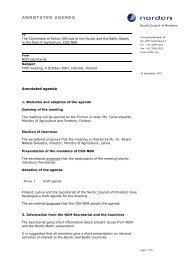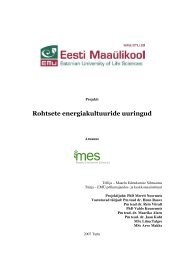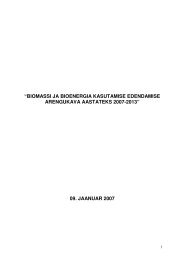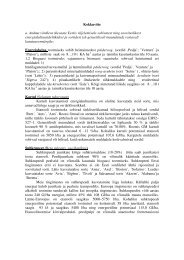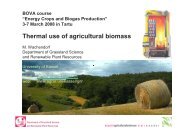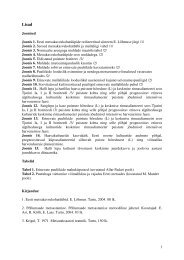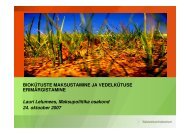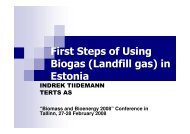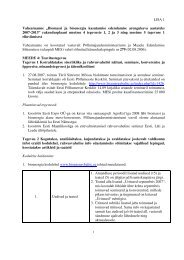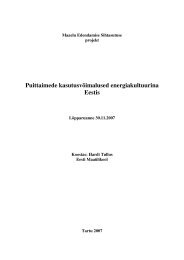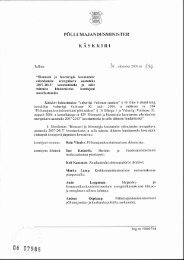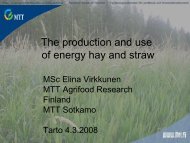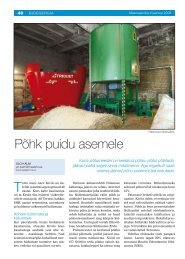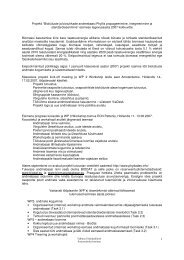Põllumajandusministeeriumi ja Maaelu ... - bioenergybaltic
Põllumajandusministeeriumi ja Maaelu ... - bioenergybaltic
Põllumajandusministeeriumi ja Maaelu ... - bioenergybaltic
You also want an ePaper? Increase the reach of your titles
YUMPU automatically turns print PDFs into web optimized ePapers that Google loves.
Taking into account the considerable production of rapeseed oil in Estonia, an interest has<br />
arisen to develop the fatty acid-based polyol production. Polyurethanes synthesized from<br />
polyols are the basis for the production of specific materials - ecoplastics which have not been<br />
widely advertised. A question arises whether the projects of respective applied research would<br />
be launched and what would be the results and output of these projects. The appropriate small<br />
scale production could improve the economic efficiency of rapeseed industry, especially in the<br />
situation where the technology of biodisel production will be declared uneconomical and its<br />
further subsidizing terminated.<br />
Support measures for production and utilization of biomass energy<br />
In Estonia the measures taken to promote the energy use of biomass have been very modest<br />
ones. As the result, the impact of these measures has been quite modest as well. The measures<br />
taken can be grouped as follows:<br />
• operating support;<br />
• investment aid;<br />
• indirect measures: tax exemption, pollution charges and some others.<br />
Since 1998 a direct scheme for supporting the use of renewable energy sources (RES) for<br />
electricity generation has been in use. At present, the scheme includes an obligation for<br />
network operators to purchase electricity generated from renewable energy sources (RES-E)<br />
applying a special feed-in tariff which has several rates depending on the energy source. No<br />
impact analysis of this measure has been carried out. In May 2007 an amendment to the<br />
Electricity Market Act was made stipulating some important changes in support schemes for<br />
RES-E generation, including the increase of feed-in tariffs. Two alternatives were introduced<br />
as options for a RES-E utility: either to select the combination of purchase obligation with the<br />
feed-in tariff, or to apply for a special subsidized tariff only. Up to now, wood fuels are not<br />
utilized for electricity generation. Nevertheless, at present two or three large cogeneration<br />
plants firing wood chips and peat are being constructed.<br />
Up to now, the investment aid in the district heating sector may be considered as the best<br />
working instrument aimed to foster the wider use of biomass based energy. Some projects for<br />
fuel switch (e.g. conversion from coal or fuel oil to wood chips) of boilers have received<br />
financial support from the state budget, but a larger amount of financial assistance has been<br />
received from foreign aid programmes, both international and bilateral ones. All these support<br />
measures (grants, soft loans, etc.) have been project-based only. Some financing has been<br />
provided in frames of joint implementation (JI), for example replacement of old oil-fired<br />
boilers with biomass-firing ones at the district heating boiler houses in Tamsalu, Kadrina and<br />
Paide.<br />
In Estonia there have been no regular national subsidies granted for production of biomass.<br />
Nevertheless, the expansion of the area under energy crops is supported by direct aid provided<br />
according to the Council Regulation 1782/2003 establishing common rules for direct support<br />
schemes under the common agricultural policy and establishing certain support schemes for<br />
farmers. Some investment support for the production of biofuel could be applied for also<br />
under the Estonian national development plan for the use of EU structural funds – single<br />
programming document 2004–2006. Currently, the support measures have been planned in<br />
frames of the Development plan 2007−2013 for enhancing the use of biomass and bioenergy<br />
and are being provided in frames of the National strategic reference framework 2007–2013.<br />
The most general economic measure supporting all investments is related to taxation of<br />
income – the corporate income tax is imposed only on the amounts collected as profits, i.e. the<br />
reinvested profit is not a subject to income tax.<br />
115



